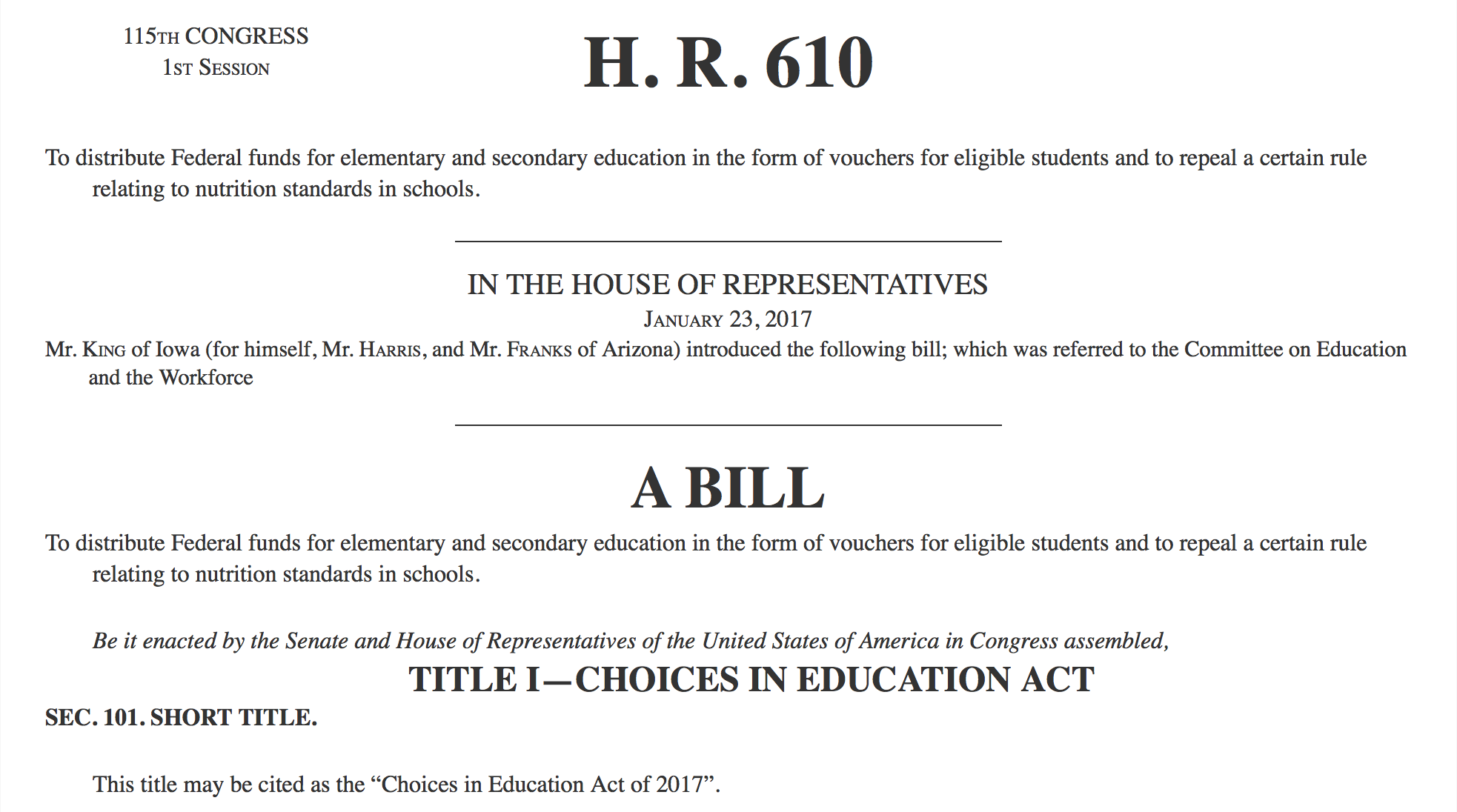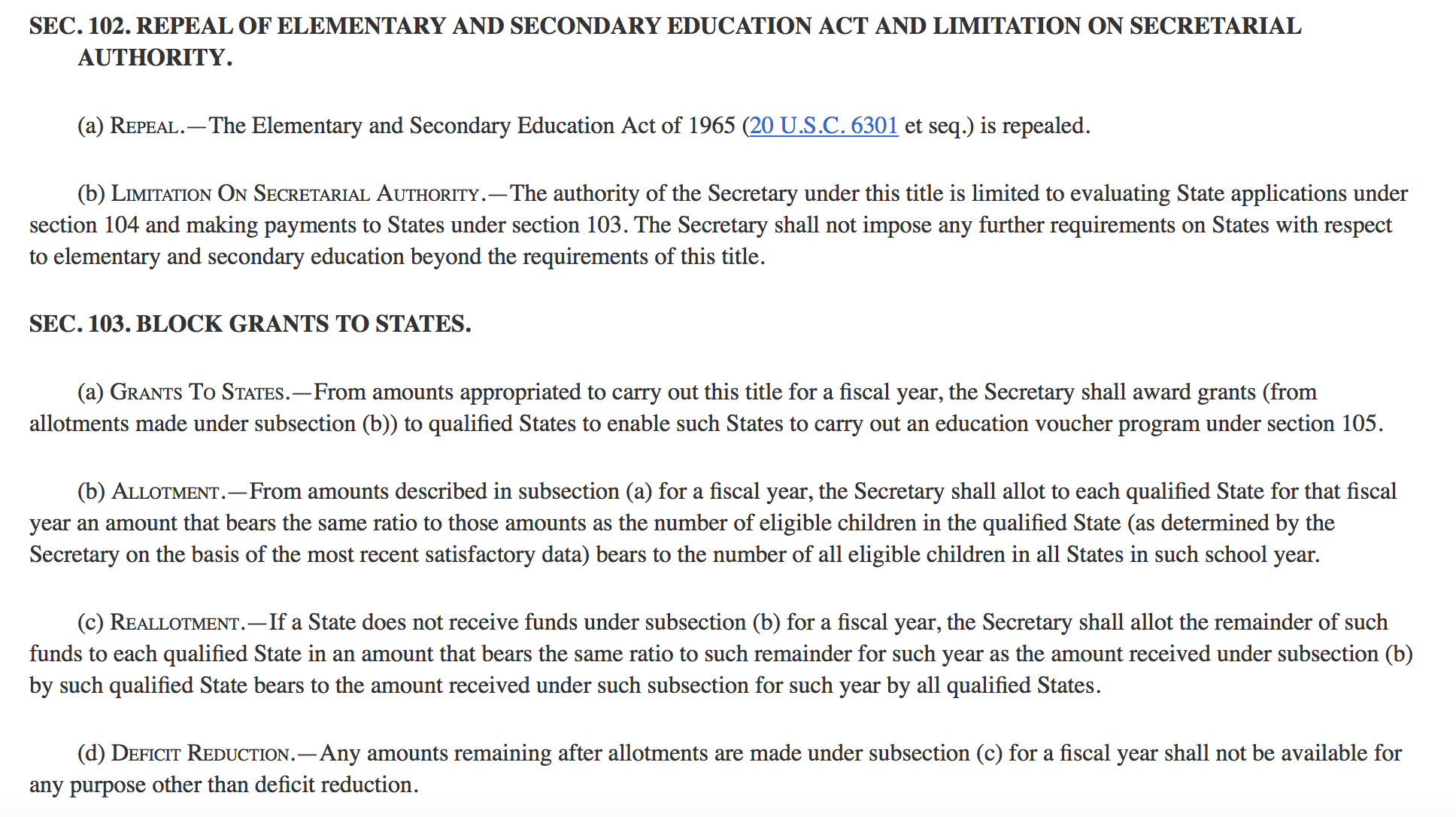 Remember the episode of Modern Family when Phil attempted to save the old family station wagon from rolling down a hill by jumping on the hood? (video clip here)
Remember the episode of Modern Family when Phil attempted to save the old family station wagon from rolling down a hill by jumping on the hood? (video clip here)
What's the plan, Phil?
Pretty sure I used that same phrase while reading through HR610 this week. HR610, a bill introduced by Representative King (R, IA), which offers among other things, vouchers to all families of school-aged children in the name of school choice. In fact the "short title" of this legislation is "Choices in Education Act of 2017". I have a lot of questions about this without even debating that "choices" in schooling already exist (a post for another day).So here we go:

Just scroll through the Elementary and Secondary Act of 1965 (and subsequent amendments and reauthorizations). This is the education bill HR610 proposes to replace. School libraries, migratory students, students in poverty, neglected and impoverished students, homeless students, English Language Learners. HR610 will do away with all of the legislation that began in 1965 during Lyndon Johnson's administration. All of it. What will support those students? A voucher program funded through block grants, apparently. So here are some of my questions:The funding: Although HR610 does not come right out and say it directly, can we all suppose that by eliminating the Elementary & Secondary Act of 1965 and all of the amendments, any further funding of current federal grant programs will disappear? And through elimination of this funding source, what services currently available to students and families will disappear?This financial report, from the Feb. 15 2017 Lowell School Committee Meeting shows the sources of Grant Funding and expenditures to date. <report>. Picking out the obvious federal funding (Title I, II, III) would include $7,386,139 and eliminate services for student support (for example, social workers in the case of Title I). Additional federal grants fund the 21st Century Schools programs. If those grants were eliminated, there would no longer be extended day or enrichment programs for students. Need homework help? Tough darts.Another report from the 15 February school committee notes ALL grant funding - private and government. Now look at this line from HR610 just in case there was any doubt that the federal government wishes to have a hand on non-federal monies (This quote is from Section 105).
So here are some of my questions:The funding: Although HR610 does not come right out and say it directly, can we all suppose that by eliminating the Elementary & Secondary Act of 1965 and all of the amendments, any further funding of current federal grant programs will disappear? And through elimination of this funding source, what services currently available to students and families will disappear?This financial report, from the Feb. 15 2017 Lowell School Committee Meeting shows the sources of Grant Funding and expenditures to date. <report>. Picking out the obvious federal funding (Title I, II, III) would include $7,386,139 and eliminate services for student support (for example, social workers in the case of Title I). Additional federal grants fund the 21st Century Schools programs. If those grants were eliminated, there would no longer be extended day or enrichment programs for students. Need homework help? Tough darts.Another report from the 15 February school committee notes ALL grant funding - private and government. Now look at this line from HR610 just in case there was any doubt that the federal government wishes to have a hand on non-federal monies (This quote is from Section 105).

Will this language from section 105 necessitate re-allocation of STATE funding toward a voucher program as well?Who is counting the students and when: The program proposed in HR610 necessitates an accurate count of ALL students in a local education agency (LEA). By ALL, HR610 means all students attending public, charter, private (religious schools included here) and those who are home-schooled.In Massachusetts, the counts of students has historically taken place on October 1, meaning that a student who is not registered for school in a district on September 29 and arrives, say on October 2nd, is not included in the Foundation Enrollment (click here for MA guidelines on who is included in the count) and therefore not part of the calculation for the Foundation Budget or per pupil allocation from the state. Wherever that student was on October 1st receives the funding for the student for that academic year.The inverse of that is also true for a student who transfers out of a district on October 2, so while this makes my accounting-brain crazy, statistically, it probably is pretty close unless an entire school closed in mid-year and resulted in a large population of new students flooding a local district.Since private school students and home-schooled students are not included in the current method of calculation it follows that adding in those students to any enrollment numbers would make a difference in the resulting amounts of money allocated per pupil. The bottom line would mean that traditional public schools would receive less funding per student. Slice the pie a bit thinner because more need a share.For a community such as Lowell with a large contingent of students with challenging needs, even less resources will no doubt have devastating results on the students who most need the supports and services currently in place. What will be eliminated?A few more questions, so bear with me:Under Section 105.2, HR610 requires that the amount of the voucher may not exceed the cost of tuition (fees, and transportation) for a private school or the cost of homeschooling?

For me, this provision opens up a number of issues. Are private (and religious) schools and home-schoolers willing to open their financial records to auditing so that a federal overseer can confirm that the voucher does not exceed the costs as defined by HR610? What costs will be allowed for home-schooling families. Program costs? Costs for the space within a dwelling (like a home office)? And for both private and home-schools, will the same requirements for time on task and academic year now apply? Will private schools be required to accept every student regardless of academic need or disability, or will those students either sign away their rights to a free and equitable education or just not receive the services that they require for academic success?Public schools have open doors; they accept every student and provide not only academic support but often social supports. I'm not certain that this proposed legislation does anything more than pander to a select group, and it concerns me. The students who require the supports provided by federal title grants will be hurt by HR610, and I cannot in good conscience support it."What's the plan, Phil?" Other than dismantling public education, I'm not sure.
 About six months ago, Adrien and I came to the realization that, despite 200+ channels offered by our favorite cable provider, we were more often than not finding little entertainment of value on television. Mostly we ended up watching television to "kill time" - not a particularly compelling reason for sitting in front of the tube after dinner. And then, there was the over $200 a month bill.So with that realization, we started to become intrigued with the idea of cutting the cord - getting rid of our cable television access. And yes, I do know boomers are notorious for not quite being on the cutting edge of technology. Yet we persisted.The television we gravitated to really was a short list. Once we started to keep track of what we really wanted to watch on television, it was fairly easy to match up streaming providers (Hulu, Roku, etc.) to our habits. Although we had an older Apple TV, we upgraded so that we could take advantage of DVR capabilities offered by streaming providers like Hulu-live.What we discovered was that we might lose one of the local (Boston) channels (WCVB). We also let go of local cable access coverage of meetings (yea, I was that person), and watch local PBS affiliate, WGBH, via the Internet. By choosing the more costly live-streaming packaged offered by Hulu (Hulu-live) we can still access local sports coverage (Red Sox!). Another advantage is that any changes to account types (i.e., from regular Hulu to Hulu-live) so far do not incur any penalties or change of service charges.The feature we've had to get accustomed to is queuing up programs that we are interested in rather than channel surfing. Our previously acquired Netflix account is easily accessed through an Apple TV app. Using Amazon Prime is naturally a little more difficult, but with a little more effort (Airplay and playing through an iPad) still accessible.We kept the same Internet access speed (200 Mbps), curtailed landline and cable. By doing so, our monthly "entertainment" costs are about $60 a month less - nearly $1,000 savings a year. At this point we are still evaluating whether the "live" feature of Hulu-live is worth the $40/month charge; regular old Hulu (with limited commercials) is $12 a month. If we discover that live TV broadcast is not something we regularly watch, we'll be able to cut our entertainment charges even more.In my opinion, however, the greatest advantage for us is that when we do sit down to watch television, we're doing so for a reason or with a particular show in mind. Reading, conversation, and dinnertimes are a lot calmer. So far, so good.
About six months ago, Adrien and I came to the realization that, despite 200+ channels offered by our favorite cable provider, we were more often than not finding little entertainment of value on television. Mostly we ended up watching television to "kill time" - not a particularly compelling reason for sitting in front of the tube after dinner. And then, there was the over $200 a month bill.So with that realization, we started to become intrigued with the idea of cutting the cord - getting rid of our cable television access. And yes, I do know boomers are notorious for not quite being on the cutting edge of technology. Yet we persisted.The television we gravitated to really was a short list. Once we started to keep track of what we really wanted to watch on television, it was fairly easy to match up streaming providers (Hulu, Roku, etc.) to our habits. Although we had an older Apple TV, we upgraded so that we could take advantage of DVR capabilities offered by streaming providers like Hulu-live.What we discovered was that we might lose one of the local (Boston) channels (WCVB). We also let go of local cable access coverage of meetings (yea, I was that person), and watch local PBS affiliate, WGBH, via the Internet. By choosing the more costly live-streaming packaged offered by Hulu (Hulu-live) we can still access local sports coverage (Red Sox!). Another advantage is that any changes to account types (i.e., from regular Hulu to Hulu-live) so far do not incur any penalties or change of service charges.The feature we've had to get accustomed to is queuing up programs that we are interested in rather than channel surfing. Our previously acquired Netflix account is easily accessed through an Apple TV app. Using Amazon Prime is naturally a little more difficult, but with a little more effort (Airplay and playing through an iPad) still accessible.We kept the same Internet access speed (200 Mbps), curtailed landline and cable. By doing so, our monthly "entertainment" costs are about $60 a month less - nearly $1,000 savings a year. At this point we are still evaluating whether the "live" feature of Hulu-live is worth the $40/month charge; regular old Hulu (with limited commercials) is $12 a month. If we discover that live TV broadcast is not something we regularly watch, we'll be able to cut our entertainment charges even more.In my opinion, however, the greatest advantage for us is that when we do sit down to watch television, we're doing so for a reason or with a particular show in mind. Reading, conversation, and dinnertimes are a lot calmer. So far, so good. One of the texts I've reviewed for a course I'm leading this summer is Jan Burkins and Kim Yaris'
One of the texts I've reviewed for a course I'm leading this summer is Jan Burkins and Kim Yaris'  Words have lots of power.How many times have you, as learners, encountered can't statements? Can't as in "I can't do math" or "I can't draw" or "I can't" just about anything. I think it was my grandmother who used to say "can't never did anything". And she was - and still is - right.I was thinking about the power of "can't" during yoga practice this week. It used to happen that when I was in a public class and a balance pose as simple as tree pose was called, my whole body would break into an anxiety sweat. I can't balance on one leg, I would tell myself. I'm too clumsy, too old.Then, one day, I switched the narrative to add in the word "yet". I can't do this... yet. Through those 3 letters, I could feel my attitude changing. "I may fall out of tree pose today, but some day I will nail it." In fact in time, that's exactly what happened.When I was actively teaching, students often would say "I can't" to everything from a writing topic to division. Adding the word yet to their statements - I can't do this yet - often made a difference for them too.Three letters. Those three letters can make all the difference for every student.
Words have lots of power.How many times have you, as learners, encountered can't statements? Can't as in "I can't do math" or "I can't draw" or "I can't" just about anything. I think it was my grandmother who used to say "can't never did anything". And she was - and still is - right.I was thinking about the power of "can't" during yoga practice this week. It used to happen that when I was in a public class and a balance pose as simple as tree pose was called, my whole body would break into an anxiety sweat. I can't balance on one leg, I would tell myself. I'm too clumsy, too old.Then, one day, I switched the narrative to add in the word "yet". I can't do this... yet. Through those 3 letters, I could feel my attitude changing. "I may fall out of tree pose today, but some day I will nail it." In fact in time, that's exactly what happened.When I was actively teaching, students often would say "I can't" to everything from a writing topic to division. Adding the word yet to their statements - I can't do this yet - often made a difference for them too.Three letters. Those three letters can make all the difference for every student. This past Tuesday, June 6, 2017, Secretary Betsy DeVos gave testimony in front of the Senate Appropriations Subcommittee on Labor, Health and Human Services, Education and Related Agencies. An overview of Secretary DeVos' testimony can be found on mlive
This past Tuesday, June 6, 2017, Secretary Betsy DeVos gave testimony in front of the Senate Appropriations Subcommittee on Labor, Health and Human Services, Education and Related Agencies. An overview of Secretary DeVos' testimony can be found on mlive  Today, May 23, is the "official" announcement of the federal budget proposal. "Official" because the numbers have been floating around in the ether for a while now. Within the proposal from the White House budget is the idea of cuts impacting education to the tune of $10.6 Billion less.Valerie Strauss from the Washington Post, has analyzed the proposed cuts to education and details them
Today, May 23, is the "official" announcement of the federal budget proposal. "Official" because the numbers have been floating around in the ether for a while now. Within the proposal from the White House budget is the idea of cuts impacting education to the tune of $10.6 Billion less.Valerie Strauss from the Washington Post, has analyzed the proposed cuts to education and details them  All Members present for both meetings.
All Members present for both meetings.
 Tuesday evening, I spoke before the City Council to encourage that body to meet with City of Lowell school administration before approving the budget that was before them. You read that correctly, I was advocating that the Council
Tuesday evening, I spoke before the City Council to encourage that body to meet with City of Lowell school administration before approving the budget that was before them. You read that correctly, I was advocating that the Council  It's budget time in Lowell and the predictions look a bit grim. I won't second guess (most) of the reasoning behind proposed budget amounts, but I am dismayed that the belt tightening has been mind numbing. As a former educator in Lowell, even without children (or grandchildren) in the City Schools, I feel compelled to speak up. Those are "my" kids who are moving along through a terrific urban district and they deserve as many opportunities as we can provide. Here's a letter that I sent to our School Committee Members this morning. I plan to attend tonight's Budget Hearing (Butler School, 6:30 pm), LISTEN and then advocate for them as best I can. I hope many of you will do this as well. Let's work together to ensure that Lowell Public Schools meet our students' needs.
It's budget time in Lowell and the predictions look a bit grim. I won't second guess (most) of the reasoning behind proposed budget amounts, but I am dismayed that the belt tightening has been mind numbing. As a former educator in Lowell, even without children (or grandchildren) in the City Schools, I feel compelled to speak up. Those are "my" kids who are moving along through a terrific urban district and they deserve as many opportunities as we can provide. Here's a letter that I sent to our School Committee Members this morning. I plan to attend tonight's Budget Hearing (Butler School, 6:30 pm), LISTEN and then advocate for them as best I can. I hope many of you will do this as well. Let's work together to ensure that Lowell Public Schools meet our students' needs.
 At last night's meeting, the School Committee met for the first time since the beginning of April. This was the first time the public got a glimpse at the proposed budget (see link within the Meeting Packet
At last night's meeting, the School Committee met for the first time since the beginning of April. This was the first time the public got a glimpse at the proposed budget (see link within the Meeting Packet  Educators, if you received a free and unsolicited book in the mail, would you read it? That's what a conservative "climate realist" group by the name of Heartland Institute wants you to do. In fact, it would be really swell if teachers would do a little more than just read their free book(s). If you would also start teaching some of their conceptions and beliefs, that would be great.Here's an introduction to this Heartland Institute courtesy of
Educators, if you received a free and unsolicited book in the mail, would you read it? That's what a conservative "climate realist" group by the name of Heartland Institute wants you to do. In fact, it would be really swell if teachers would do a little more than just read their free book(s). If you would also start teaching some of their conceptions and beliefs, that would be great.Here's an introduction to this Heartland Institute courtesy of  I was thinking about
I was thinking about  According to the current Secretary of Education, Betsy DeVos, parents need to have a choice in a child's education. It appears, however, that "choice" has limits.According to state and federal government, there should be a "choice" of educational setting. School setting is a choice, whether it is public, charter, private, or religious. That's a good choice according to the government. Using federal funds to pay for vouchers? That's the current federal proposal. And our government claims that that kind of choice is also a "good" choice.However, if you exercise your parental judgement by choosing to opt your child out of long, arduous, standardized tests like MCAS 2.0 or PARCC, then your choice as a parent is questionable. The Massachusetts Department of Elementary and Secondary Education really does not want parents to make that choice. Why? Because in assessments, unless a significant number of students participate in those tests, the reported results may become skewed or inaccurate.The issue of test participation rates is part of the newest federal education act, ESSA (Every Student Succeeds Act). The current
According to the current Secretary of Education, Betsy DeVos, parents need to have a choice in a child's education. It appears, however, that "choice" has limits.According to state and federal government, there should be a "choice" of educational setting. School setting is a choice, whether it is public, charter, private, or religious. That's a good choice according to the government. Using federal funds to pay for vouchers? That's the current federal proposal. And our government claims that that kind of choice is also a "good" choice.However, if you exercise your parental judgement by choosing to opt your child out of long, arduous, standardized tests like MCAS 2.0 or PARCC, then your choice as a parent is questionable. The Massachusetts Department of Elementary and Secondary Education really does not want parents to make that choice. Why? Because in assessments, unless a significant number of students participate in those tests, the reported results may become skewed or inaccurate.The issue of test participation rates is part of the newest federal education act, ESSA (Every Student Succeeds Act). The current  Something happened this evening preventing the live broadcast of Lowell's School Committee Meeting for March 1. Until the taped meeting materializes, there won't be any notes about what transpired; however, this doesn't mean there isn't anything to think about.Found in the Permissions to Enter, are 4 requests totaling $882,470. All of these requests are expenditures from the Special Education Tuition account and are for Out of District (OOD) costs to agencies servicing student Individual Education Plans (IEPs).When the services necessary to provide a free and adequate education for a student cannot be met within the local school district, they must be contracted out. It is the
Something happened this evening preventing the live broadcast of Lowell's School Committee Meeting for March 1. Until the taped meeting materializes, there won't be any notes about what transpired; however, this doesn't mean there isn't anything to think about.Found in the Permissions to Enter, are 4 requests totaling $882,470. All of these requests are expenditures from the Special Education Tuition account and are for Out of District (OOD) costs to agencies servicing student Individual Education Plans (IEPs).When the services necessary to provide a free and adequate education for a student cannot be met within the local school district, they must be contracted out. It is the  In thinking about what might happen should a voucher program become reality, I took a look at what currently occurs with traditional public schools and charter schools. Charter Schools should reflect a similar demographic to the local public school district. In principle, sometimes charter schools do, but sometimes they do not.In Lowell, the
In thinking about what might happen should a voucher program become reality, I took a look at what currently occurs with traditional public schools and charter schools. Charter Schools should reflect a similar demographic to the local public school district. In principle, sometimes charter schools do, but sometimes they do not.In Lowell, the 
 Neither of the two charter schools have special education students needing either substantially separate services or separate schools/facilities/homebound-hospital placements?So as the proponents of a voucher, or "choice" system continue to push their agenda forward, I'll be watching to see if those hollering about choice for all families and students really mean
Neither of the two charter schools have special education students needing either substantially separate services or separate schools/facilities/homebound-hospital placements?So as the proponents of a voucher, or "choice" system continue to push their agenda forward, I'll be watching to see if those hollering about choice for all families and students really mean  Remember the episode
Remember the episode
 So here are some of my questions:The funding: Although HR610 does not come right out and say it directly, can we all suppose that by eliminating the Elementary & Secondary Act of 1965 and all of the amendments, any further funding of current federal grant programs will disappear? And through elimination of this funding source, what services currently available to students and families will disappear?This financial report, from the Feb. 15 2017 Lowell School Committee Meeting shows the sources of Grant Funding and expenditures to date. <
So here are some of my questions:The funding: Although HR610 does not come right out and say it directly, can we all suppose that by eliminating the Elementary & Secondary Act of 1965 and all of the amendments, any further funding of current federal grant programs will disappear? And through elimination of this funding source, what services currently available to students and families will disappear?This financial report, from the Feb. 15 2017 Lowell School Committee Meeting shows the sources of Grant Funding and expenditures to date. <
